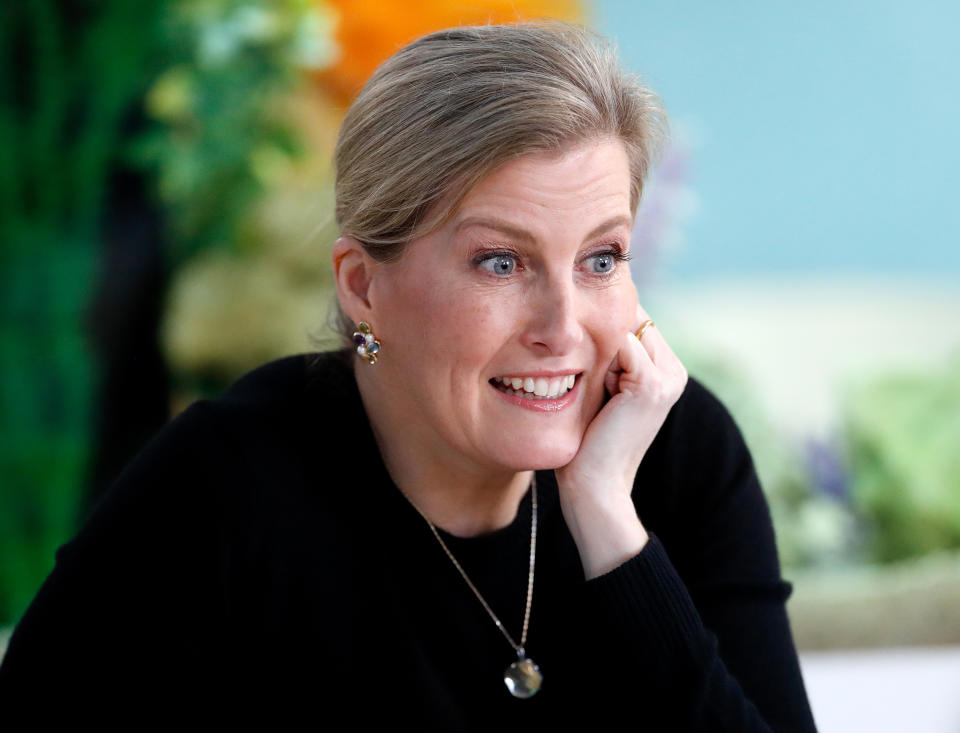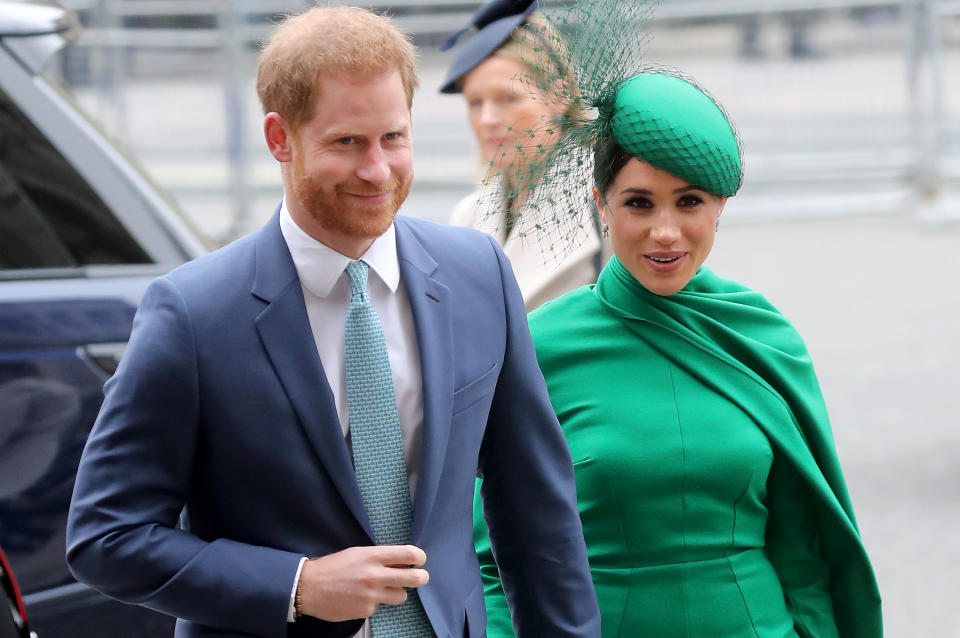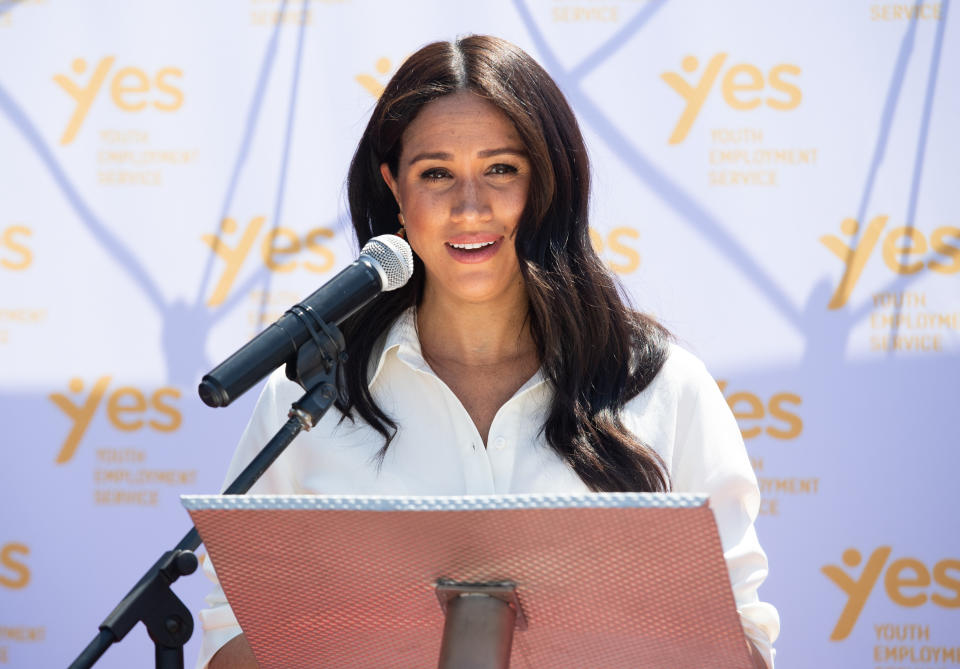Would Meghan Markle have been allowed to make her Black Lives Matter speech as a senior royal?
Meghan Markle made a deeply personal speech to the graduating class of her former high school in the wake of the death of George Floyd.
The Duchess of Sussex, 38, shared her own experiences of growing up in Los Angeles in the wake of the 1992 beating of Rodney King and the riots that followed.
Speaking on 4 June, she told the teenagers leaving school that she was sorry they had to grow up in a world in which there were still inequalities and racism.
The speech also encouraged them to use their voices to vote and to make changes to the world they were entering.
Now, former press secretary to the Queen Dickie Arbiter, has suggested such a speech could never have been made if she had still been a senior royal.
He told Newsweek: “It would have been pretty impossible.
"What's happened in the states is an absolute tragedy and it should never have happened but unfortunately it did happen.
"Had Meghan and Harry still been in the UK and working members of the royal family that speech couldn't have happened.
"I'm talking about the whole speech, end of. It's highly politicised because of the very nature of what it is.
"And it's starting to voice opinions about the internal affairs of another country. I don't think the queen has to say anything.
"It is a social issue for the United States and it is not for a head of state to voice an opinion, whether the queen or the president of France or whoever."

While the Queen herself would not wade directly into political matters, there are examples of royals voicing support for similar issues to race equality including gender equality.
Omid Scobie, biographer of Harry and Meghan, responded to Arbiter in Newsweek by saying: “For the simple fact that racism and police brutality is a human rights issue, not political, I'd like to think that Meghan's speech would have been just as possible as a working member of the Royal Family.”
Sophie, Countess of Wessex, on gender equality
In a speech in Kenya in September 2019, Sophie, the Countess of Wessex, said gender equality was a “fundamental right” and said women should have more political participation.
The speech was opened with greetings from the Queen.
Speaking about the role of the Commonwealth, she said: “Together we need to have an increased focus on ending gender inequality and discrimination, and an increased focus on building environments that enable women’s political participation and economic empowerment.
“Only by ensuring the sustained rights of women and girls will we see justice and inclusion and a transformed future.”

Read more: Meghan Markle shares ‘devastation’ at George Floyd’s death in speech to her former LA high school
She also said: “Earlier this year I publicly committed myself to championing women's meaningful participation in peace processes and to support the vital role women are already playing in resolving conflict, countering violent extremism and building peace at the local level.”
Sophie continued: “But we must not limit our ambitions - we also want to promote women as negotiators, as ceasefire and peace agreement monitors, as front-line peacekeepers and as political leaders.”
Part of the reason she was in Kenya was to launch the “Platform for Girls' Education policy paper on gender responsive education sector planning”.
And she even went onto quote the Queen, saying: “Her Majesty The Queen reminded us all earlier this year as we celebrated the 70th anniversary of the Commonwealth that the "nations of the Commonwealth agreed to move forward as free and equal members".
“This equality I believe does not just mean those in government, or at the top of the tree of enterprise... it encompasses all of society regardless of gender, of background, or origin, race or religion.”
Prince Harry, Duke of Sussex, on gender equality
During Harry and Meghan’s tour of Africa, which took them to South Africa for several days, both of them made comments which spoke about the ongoing reform and drive to equality in the nation.
Speaking in Johannesburg, Prince Harry said: “We will always seek to challenge injustice and to speak out for those who may feel unheard. So no matter your background, your nationality, your age or gender, your sexuality, your physical ability, no matter your circumstance or colour of your skin – we believe in you, and we intend to spend our entire lives making sure you have the opportunity to succeed and change the world.”

Speaking to Queen’s Young Leaders in June 2018, Harry said: “Your generation is the first that will have to deal hands-on with topics and issues that have been known about for a very long time. You are the future leaders who will need to pick up the baton on issues such as climate change, food security, equality and access to education, and improving the lives of the most vulnerable people in our communities.”
Meghan, Duchess of Sussex, on equality
Even before she stepped back as a senior royal, there were statements which could be seen as commenting on internal affairs in a country.

In Johannesburg in 2019, she said: “The recent crisis has sparked a much-needed conversation in South Africa, and the world is listening. I met a group of young girls yesterday who wanted to talk to me about their experience. Some of which was harrowing.
“As someone who has been a long-time advocate of women's and girls’ rights, I worried about what was happening and my intention on this tour was to meet with women across South Africa to listen and to learn.
“So from students to politicians, from apartheid campaigners of the 50s to teenagers on a beach, from the mothers with HIV providing health care to their community, and to the entrepreneurs who are driving the businesses of the future - they all showed me a power and a solidarity that, in this moment, in this time, all women, and all people, can take strength and inspiration from. Because these amazing African women have discovered self-belief and found their worth.”
On the same trip she said: “We are encouraged to hear your President take the next steps to work towards preventing gender-based violence through education and necessary changes to reinforce the values of modern South Africa.”
William, Duke of Cambridge, on gender equality and climate change
In a speech delivered in Namibia, he said: “Namibia remains a strong supporter of the principles set out in the Commonwealth Charter, and you have shown particular leadership on issues such as gender equality and climate change.
“I'm particularly pleased to learn that Namibia is joining the Commonwealth Clean Oceans Alliance as part of a Government programme to reduce plastics, including in national parks.”

William, Duke of Cambridge, on writing to ministers
In an interview with GQ in 2017, William admitted that he writes to ministers, something his father is known to have done too.
William insisted he did not lobby the leaders, but said he helps out the charities he represents by putting them in touch with the right politicians.
He said: “I have written to ministers but purely to point them towards people I think they should see.
“So a charity might ask me if I can help with someone and I can help get them access to the people in Government. There are issues I am interested in and I am happy to connect people to ministers.”
The Queen on political issues
The Queen herself is said to have waded into political issues, including Brexit and the UK’s relationship with Ireland.

In her Christmas message in 2019, her comments about reconciliation were seen as a veiled comment intended to calm tensions between leave and remain camps as Brexit was delayed.
She closed her message by saying: “It’s a timely reminder of what positive things can be achieved when people set aside past differences and come together in the spirit of friendship and reconciliation. And, as we all look forward to the start of a new decade, it’s worth remembering that it is often the small steps, not the giant leaps, that bring about the most lasting change.”
Read more: Queen granted permission to repair Buckingham Palace roof - 200 years after leak spotted
And in 2014, she hosted a state visit by the Irish head of state, and said: “Even more pleasing, since then, is that we, the Irish and British, are becoming good and dependable neighbours and better friends; finally shedding our inhibitions about seeing the best in each other.
“Our two governments have responded to the change in mood. We now cooperate across the full range of public business; indeed, there is today no closer working relationship for my Government than that with Ireland.”
She even stated: “Our two governments will continue to work together in Northern Ireland to support the First and Deputy First Minister and the Executive to advance the peace process and to establish a shared society based on mutual respect and equality of opportunity.”
While Royal Family members might never tell you who they have voted for, there are clear examples of when they made comments about the internal workings of other countries, and lent their vocal support to issues which sometimes stray into politics.



